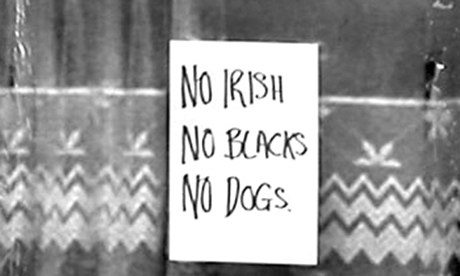But they do exist, even if (thankfully) not like the used to.
Charleston is a beautiful city and there have been beautiful gospel scenes broadcast from that city in these last days. But obviously all is not beautiful in South Carolina, just like all is not beautiful in Michigan, and all is not beautiful in the human heart.
I’ve grown up my whole life hearing that racism was wrong, that “prejudice, discrimination, or antagonism directed against someone of a different race based on the belief that one’s own race is superior” (to use one of the first definitions that popped up on my phone) is sinful. I’ve heard it from my parents, from my public school, from my church, from my college, and from my seminary. The vast majority of Americans know that racism is wrong. It’s one of the few things almost everyone agrees on. And yet, I wonder if we (I?) have spent much time considering why it’s wrong. We can easily make our “I hate racism” opinions known (and loudly), but perhaps we are just looking for moral high ground, or for pats on the back, or to win friends and influence people, or to prove we’re not like those people, or maybe we are just saying what we’ve always heard everyone say. As Christians we must think and feel deeply not just the what of the Bible but the why. If racism is so bad, why is it so bad?
Here are ten biblical reasons why racism is a sin and offensive to God.
1. We are all made in the image of God (Gen. 1:27). Most Christians know this and believe it, but the implications are more staggering than we might realize. The sign pictured above is not just mean, it is dehumanizing. It tried to rob Irish and Blacks of their exalted status as divine image bearers. It tried to make them no different than animals. But of course, as a white man I am no more like God in my being, no more capable of worship, no more made with a divine purpose, no more possessing of worth and deserving of dignity than any other human of any other gender, color, or ethnicity. We are more alike than we are different.
2. We are all sinners corrupted by the fall (Rom. 3:10-20; 5:12-21). Everyone made in the image of God has also had that image tainted and marred by original sin. Our anthropology is as identical as our ontology. Same image, same problem. We are more alike than we are different.
3. We are all, if believers in Jesus, one in Christ (Gal. 3:28). We see from the rest of the New Testament that justification by faith does not eradicate our gender, our vocation, or our ethnicity, but it does relativize all these things. Our first and most important identity is not male or female, American or Russian, black or white, Spanish speaker or French speaker, rich or poor, influential or obscure, but Christian. We are more alike than we are different.
4. Separating peoples was a curse from Babel (Gen. 11:7-9); bringing peoples together was a gift from Pentecost (Acts 2:5-11). The reality of Pentecost may not be possible in every community–after all, Jerusalem had all those people there because of the holy day–but if our inclination is to move in the direction of the punishment of Genesis 11 instead of the blessing of Acts 2 something is wrong.
5. Partiality is a sin (James 2:1). When we treat people unfairly, when we assume the worst about persons and peoples, when we favor one group over another, we do not reflect the God of justice nor do we honor the Christ who came to save all men.
6. Real love loves as we hope to be loved (Matt. 22:39-40). No one can honestly say that racism treats our neighbor as we would like to be treated.
7. Everyone who hates his brother is a murderer (1 John 3:15). Sadly, we can hate without realizing we hate. Hatred does not always manifest itself as implacable rage, and it does not always–or, because of God’s restraining mercy, often–translate into physical murder. But hatred is murder of the heart, because hatred looks at someone else or some other group and thinks, “I wish you weren’t around. You are what’s wrong with this world, and the world would be better without people like you.” That’s hate, which sounds an awful lot like murder.
8. Love rejoices in what is true and looks for what is best (1 Cor. 13:4-7). You can’t believe all things and hope all things when you assume the worst about people and live your life fueled by prejudice, misguided convictions, and plain old animosity.
9. Christ came to tear down walls between peoples not build them up (Eph. 2:14). This is not a saccharine promise about everyone setting doctrine aside and getting along for Jesus’s sake. Ephesians 2 and 3 are about something much deeper, much more glorious, and much more cruciform. If we who have been made in the same image, born into the world with the same problem, find the same redemption through the same faith in the same Lord, how can we not draw near to each other as members of the same family?
10. Heaven has no room for racism (Rev. 5:9-10; 7:9-12; 22:1-5). Woe to us if our vision of the good life here on earth will be completely undone by the reality of new heavens and new earth yet to come. Antagonism toward people of another color, language, or ethnic background is antagonism toward God himself and his design for eternity. Christians ought to reject racism, and do what they can to expose it and bring the gospel to bear upon it, not because we love pats on the back for our moral outrage or are desperate for restored moral authority, but because we love God and submit ourselves to the authority of his word.
